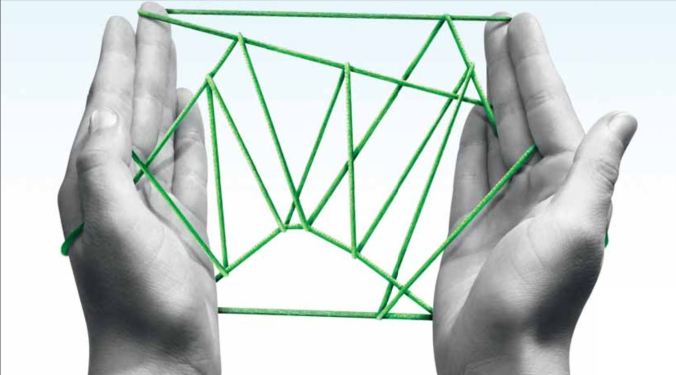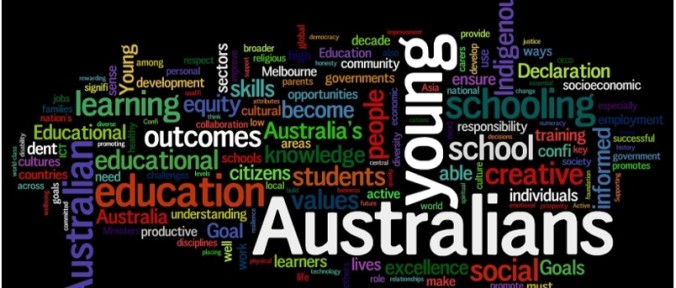
Signed on the 5th December 2008 the Melbourne Declaration supersedes the 1989 Hobart Declaration and the 1999 Adelaide Declaration. The Melbourne Declaration outlines ‘The Educational Goals for Young Australians’ and represented collaboration and joint agreement between all Australian Education ministers – the federal education minister and the eight education ministers of the states and territories. Goal One states that ‘Australian schooling promotes equity and excellence’ and Goal Two is that ‘All young Australian become: successful learners, confident and creative individuals, and active and informed citizens’ (p. 7).
Many of the elements of the Melbourne Declaration were present in both the Hobart and Adelaide Declarations. Common elements of the three national educational goals documents include:
- the desire for Australia’s schooling system to be characterised by ‘excellence’
- a holistic view of education, which provides for students’ intellectual, physical, moral spiritual and aesthetic development.
- to develop in students an appreciation of our cultural heritage
- a desire to equip students for the future workplace and to meet the emerging needs of the economic workforce
- to foster positive attitudes to vocational training and life-long learning
- the creation of an active and informed citizenry
- provisions for the development of students’ fitness and health
- a robust curriculum that includes basic literacy and numeracy; computing and technological skills, maths and science; Australian history and geography, the creative arts, languages other than English, and a values education that includes ethics, environmental concerns and social justice.
In addition to these common elements, the Hobart Declaration (signed in 1989) describes the establishment of efforts to develop a national curriculum and the commitment of the states to the establishment of a common handwriting style, common age of school entry and strategies to improve the quality of teaching (MCEECDYA, 2009).

We are due for an update
In late 2018, the Federal Minister for education Dan Tehan announced that he would meet with the Education ministers in 2019 to discuss updating the Melbourne Declaration. Previous NSW Education Minister Verity Firth reflects on the Melbourne Declaration 10 years on:
It is good to see the Education Minister Dan Tehan announce that he will be taking a plan to update the Melbourne Declaration to the next Education Council meeting in December. However, rather than going back to the drawing board and attempting to reshape a whole new vision, I would suggest that education ministers concentrate on the hardest piece of the policy puzzle – implementation.
But what has changed in the intervening decade is the abundance of policy work mapping specific pathways towards those goals.
The historic Gonski Review Report identified in 2011 that Australia has an unacceptable correlation of low levels of achievement and students from low socioeconomic and Indigenous backgrounds, and according to OECD data, Australia is one of the few countries in the OECD where the inequality gap between our highest and lowest performers is widening.
[…]
Reflecting on the Melbourne Declaration’s original goals a decade later, two things become apparent: that they are as relevant now as they were then, and that we still have a long way to go in achieving them.
Let us never forget that education is an engine for hope. It is powerfully transformative. The Melbourne Declaration marked a high point in political and sector consensus about the key educational goals for young Australians. The lack of real action, particularly in relation to the Gonski funding reforms, is desperately disappointing. Ten years is an entire generation for a student.
The review of the Melbourne Declaration hasn’t gone ahead
However, the meeting of Ministers to update the Melbourne Declaration hasn’t happened as planned. According to a media release from the AEU, Victoria’s Education Minister James Merlino pulled out of a national discussion forum scheduled in February. “Min Merlino said he was not prepared to sit in a room and discuss a vision for national education with Min. Tehan”.
The Australian Education Union has stated:
The Australian Education Union will not participate in any review of the Melbourne Declaration which does not have the support of every state and territory Minister and while the critical issue of funding our schools fairly is outstanding.
We support Min. Merlino’s decision not to take part in the national forum, and we will also be boycotting this shambolic review process.
What does this mean for the Melbourne Declaration?
The commonalities between the Hobart, Adelaide and Melbourne Declarations suggest that the various education systems in Australia have been working slowly towards the same goals for the past three decades.
We could interpret the lack of an update as a sign that although the goals of the Melbourne Declaration have not yet been met, they are still worthy and worth working towards. Is there any need to re-think them when instead we could continue implement them?
Another interpretation is that the Morrison Government lacks the political will to get all the necessary heads around the table for a discussion about the overarching goals for education of Australia’s young people.
Regardless of the meaning behind the delay it is worth thinking about the Melbourne Declaration and what it says about the purposes of education in Australia.
The Melbourne Declaration as a statement of Educational Purpose
[My colleague Amy MacPherson and I had the following to say about the Melbourne Declaration in 2013] Viewing the Melbourne Declaration as a document that justifies purposes as diverse as; increased standardised testing, concerns and action on issues of educational equity, increased use of ICT, better physical activity, and informed environmental programs, warrants education returning to some core questions.
- What goals should we have and why?
- What priority should be attached to each?
- Are the means selected compatible with them?
Such questions are not exactly new to education, however, may have been lost in recent years in the ongoing debates concerned with identifying the most efficient means to deliver schooling. If we concentrate purely on the means of delivery we miss the opportunity to stand back and ask ourselves a host of important questions about the direction in which we are heading.
- Are we concerned about the role of the individual to society (and not just a national society but a global one)?
- Are we concerned about the contemporary meanings attached to justice, equity (both generational and intergenerational), inclusion, multiculturalism, wellbeing, sustainability and the current state of our democracy?
- And are we concerned about who is advocating a particular ideology for us to follow and their reasons for doing so? (and the authors are not exempt from this).
Education itself (and not just economics and politics) is an important stakeholder in the debate about educational purposes. Being engaged with these issues is not easy for any of us, but they are important because it “requires that we keep working on the question as to what is distinctively educational about education” (Biesta, 2012, p.2).
References:
Biesta, G. (2012). Philosophy of Education for the Public Good: Five challenges and an agenda. Educational Philosophy and Theory, 44(6), 581-593.
Chapman, A. & Buchanan, R. (2013). Educational purposes and the Melbourne Declaration, Professional Educator, 12, 5, pp. 24 -27. http://fellowship.austcolled.com.au/wp-content/uploads/2017/09/27.-Prof-Ed-Oct-2013.pdf
Ministerial Council for Education, Early Childhood Development and Youth Affairs [MCEECDYA]. (2009). The Hobart Declaration on Schooling (1989). Accessed on 28th August, 2011, from http://www.mceecdya.edu.au/mceecdya/hobart_declaration,11577.html
Ministerial Council for Education, Employment, Training and Youth Affairs [MCEETYA]. (1999). The Adelaide Declaration on National Goals for Schooling in the Twenty-First Century. Accessed on 28th August, 2011 from http://www.curriculum.edu.au/mceetya/nationalgoals/natgoals.htm
Ministerial Council for Education, Employment, Training and Youth Affairs [MCEETYA]. (2008). Melbourne Declaration on Educational Goals for Young Australians, December 2008. Retrieved from http://www.curriculum.edu.au/verve/_resources/National_Declaration_on_the_Educational_Goals_for_Young_Australians.pdf